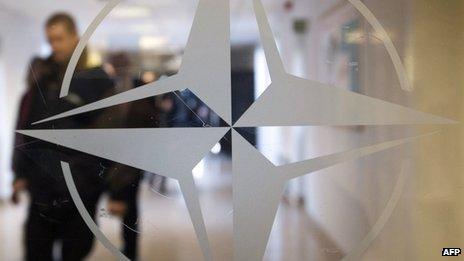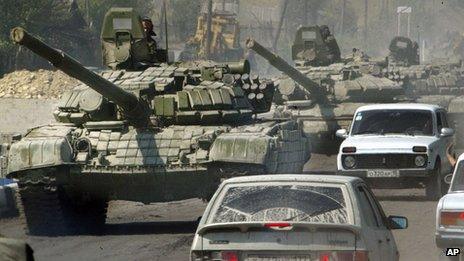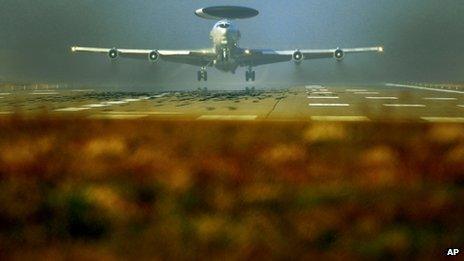Analysis: Russia's Crimea move poses West huge questions
- Published

Nato now faces perhaps its greatest post-Cold War challenge
It may not be Belgium's answer to the Sochi Winter Olympics but the roof-line of Nato's shiny new headquarters in Brussels looks like several giant ski-jumps fused together.
The new headquarters - as yet unfinished and over-budget - seemed to many critics a costly extravagance at a time when the alliance was searching for a role. Even more so since cost-cutting was forcing Nato countries to reduce staffing levels significantly.
The echo of Sochi is coincidental, but the upsurge of tensions between Russia and the West may have given Nato new purpose. Indeed the crisis in the Crimea could well have significant longer term implications: for Nato; for the European Union; for Washington's relationship with Europe; and for the future pattern of energy supplies.
Though much of the rhetoric and the cast of characters may be reminiscent of earlier times, this will not simply be a reprise of the Cold War. Russia, for one thing, is not the Soviet Union. The globalised economy provides a very different context, and we are a long way from a military confrontation between Moscow and the West.
But nobody should be under any illusions. The crisis in the Crimea is the most significant drama to hit the Euro-Atlantic area since the end of the Cold War.
Hopes dashed
As the 20th Century came to a close, there were some who claimed that the collapse of the Soviet Union marked an "end to history". The idea, put crudely, was that we were all capitalists now and that the great ideological divisions that had blighted the world for nearly 100 years were now over.
Such views were quickly seen as premature. But they nonetheless persisted in the sense that there was still a strong desire in the West to see Russia - and China - as partners, countries that could be made responsible stakeholders in the international system.
China's behaviour in the East and South China Seas raises questions in many of its neighbours' minds about the validity of this thesis. But as for Russia, its move in the Crimea buries such ideas once and for all.
Narratives are important here. There was a sense in the West that they had given up traditional power-politics, downplaying military aspects of power as defence budgets tumbled (itself a product of austerity as much as anything else), while focusing upon economic and soft power.
Taste of the future
That, of course, was not the way things were seen in Moscow, which saw a series of unilateral Western military actions - in the Balkans, in Iraq, and in Libya - as a sign that the West would use its power in an arbitrary and unilateral fashion.

Russia's unanswered intervention in Georgia may have convinced it the West was weak
This, coming after the advance of Nato's frontiers ever-closer to Russia, seemed to confirm President Vladimir Putin in his view that only by reasserting Moscow's role in the former Soviet-space could his country's prestige and security be assured. The defence of Russian minorities became both a goal and a tactic to achieve this end.
The 2008 crisis with Georgia, which saw Moscow effectively establishing two Russian-speaking protectorates carved out from Georgia-proper, was just a taster. Crimea itself is not the main course; that is Ukraine itself.
Nobody knows Mr Putin's long-term goals here. His short-term actions have certainly contributed to the establishment of a strongly anti-Russian government in Kiev.
But Russia clearly wants influence over Ukraine as a whole. Whether it seeks to bite off further chunks of Ukrainian territory, or simply settles for seeking to undermine the new authorities in Kiev from within, the clear signal is that this crisis does not end with the Crimea vote. The fate of Ukraine could see Russia and the West at loggerheads for some time to come.
US priorities
The implications of this are considerable. It has not been the European Union's finest hour, with clear divisions between its members based largely upon their own histories with Moscow and their proximity to Russia's borders.
Foreign policy has always been a problematic area for the EU, one largely based upon a "lowest common denominator" approach, which is not necessarily the best way to tackle a major crisis.

Nato has beefed up air coverage but faces longer-term questions about its resolve
One consequence of all of this will be a revived Nato, but there must still be huge questions as to whether the alliance countries can match their stronger rhetoric with increased defence capability.
Some of the biggest questions are posed for Washington. For all the talk about an Asian pivot and the desire to hand over some responsibility to its European allies, this crisis underscores the central role of the US in European security.
By an accident of timing it is US aircraft that are carrying out Nato's air policing mission over the Baltics, so it is US jets that have been despatched to reinforce them, and more US aircraft have been sent to Poland. Going forward, the Pentagon may now have to look at how to guarantee the reassurance of its allies for the long-term.
Rhetoric cheap
There will be big diplomatic questions for the US as well. Many will want to look again at how the whole relationship with Russia has been managed, ranging from the failure to respond strongly to the Georgian crisis during the previous presidency to the failure of Mr Obama's "re-set" of ties with Moscow.
But, equally, Washington is well aware that tensions with Russia could have ramifications across a broad swathe of international activity: work at the UN; the Iranian nuclear dossier; the crisis in Syria and so on.
The economic impact of the crisis could also be significant depending upon how it evolves, and the seriousness of Western economic sanctions.
The problem is that Russia, too, has cards it can play. Damage can be done to the Russian economy but at a cost to the wider global economic system; something US and Western European politicians are only too aware of. Rhetoric is cheap. Real actions have a price.
In the longer term, as the British Foreign Secretary William Hague noted in the House of Commons, Europeans might accelerate efforts to move away from their dependence upon Russian gas supplies. The prospect of enhanced US exports could be important here but this is for the medium-term. For the time being Russia and Europe remain locked in an energy embrace that, if disrupted, will be damaging for both of them.
The stakes here are huge. The international system is facing a major turning point with implications that go well beyond Russia's immediate neighbourhood.
Two decades after the end of the Cold War there could now be the prospect of a much more distant and antagonistic relationship between Russia and the West becoming the new norm.